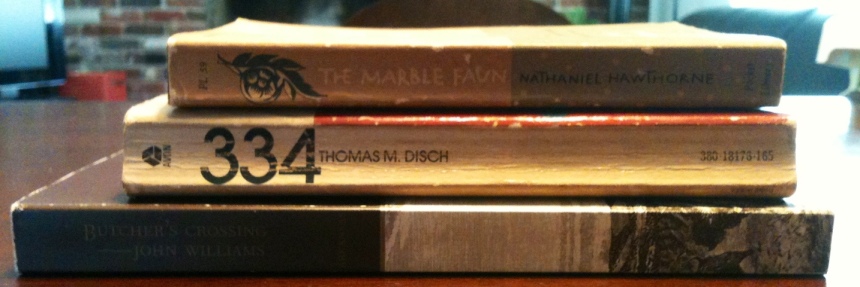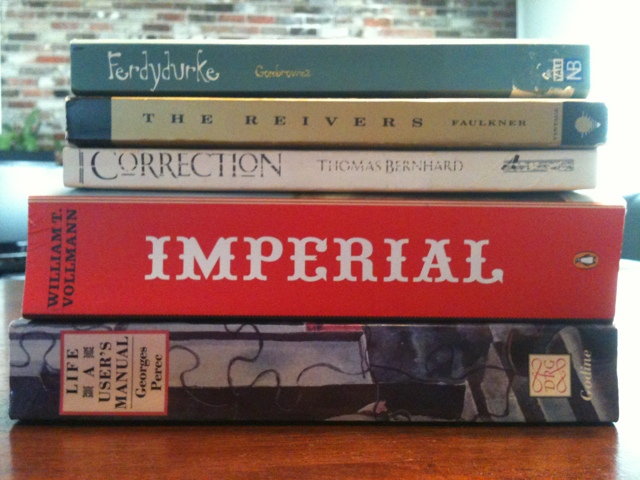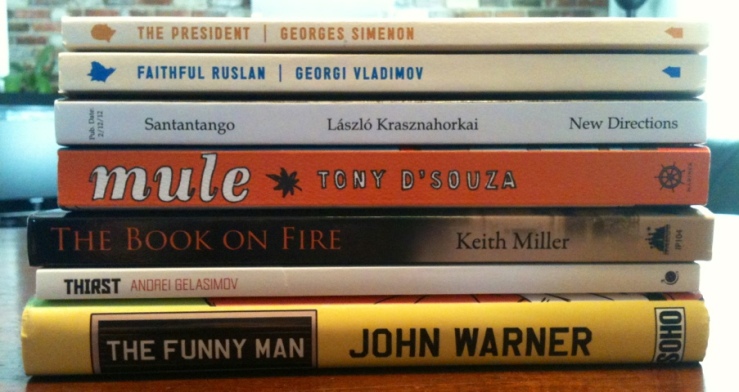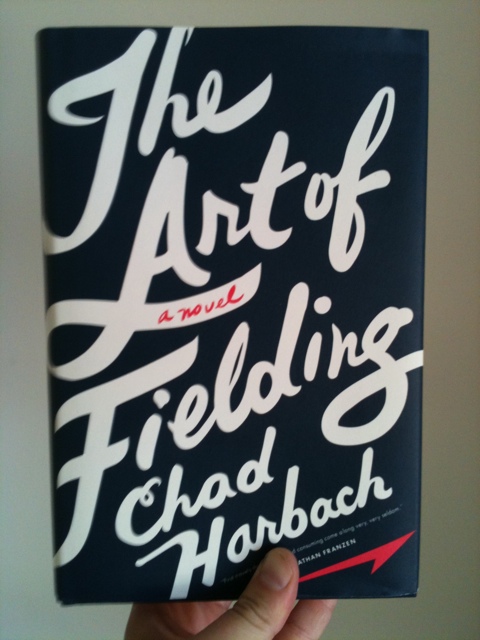Genre fiction gets a bad rap from some readers and critics because it often rigidly follows a set of formal conventions, from plot to character to prose, to satisfy reader expectations. One mark of literary fiction, in opposition to genre fiction, might be that the literary work disrupts or destabilizes these conventions (works that get called experimental tend to explode these conventions or radically recombine them). Harold Bloom, in The Western Canon (and elsewhere), argues that it is the strangeness and originality of a work that confers its literary power; in some cases, he argues, this strangeness assimilates us (the readers, the culture) to the point that we can no longer recognize its strangeness. While Bloom may be a pompous windbag (and really, what literary critic worth his salt isn’t?), and I don’t always agree with him (especially in his unrelenting agon with “The School of Resentment”), I think he’s given us a good rubric by which to measure or understand what sets great literature apart from the ordinary, the conventional, the ephemeral.
I bring all of this up because it seems to me that literary fiction is its own genre, one with its own conventions, tropes, and formulations. The genre of literary fiction is as much a marketing tool, of course, as it is a set of conventions, and publishers release these books because the author’s Great Ambition and Sterling Prose and Big Ideas (in theory) cast esteem back on the publisher. And while there are plenty of great books with major houses behind them, many books claiming to be “literary fiction” are simply conventional retreads of an antiquated formula, outfitted in the grand themes of the day (these days, that tends to “identity”). These books offer no strangeness, make no attempt to open the realm of literary possibility. They are intellectual comfort food. And there’s nothing wrong with that, just as there’s nothing wrong with a good mystery novel. But I think we lie to ourselves when we overinflate the powers of our “literary” novelists. I enjoyed Jeffrey Eugenides’s middlebrow Middlesex as much as the next lad, for example, but still find it wildly overrated. Another example: Michael Chabon is not my cup of tea, but I wouldn’t argue against his talent. Still, even when he attempts the strange (The Yiddish Policemen’s Union, for example), he’s blandly trying territory already colonized by others. Give me Philip K. Dick or George V. Higgins any day.
My favorite novels tend toward strangeness; they upset or confound or baffle me. I love it when I have no idea what the novelist is doing. And while reckless innovation or experimentation for its own sake can sometimes fall flat (or fall apart), an interesting failure is better than another complacent, forgettable entry in the non-canon of contemporary “literary fiction.”
Which brings me to Chad Harbach’s wildly over-hyped novel The Art of Fielding.
Let me be up front: Yes, this is backlash. The acclaim directed at this novel deserves backlash—although I’d like to be clear up front that I’m not trying to attack the novel itself; that would be like attacking a run-of-the-mill sci-fi novel for indulging in run-of-the-mill sci-fi tropes. My aim is simply to point out that Harbach’s book is no great feat of literature, no work of astounding genius—it’s just run-of-the-mill literary fiction. And yes, I didn’t read past page 100, which conveniently is the last page of chapter 11. Why would I slog it out through 400 more pages when there are so many great books in the world that I haven’t read and precious little time in which to read them? And that’s the point of the rant that follows.
The book is not entirely terrible. It just isn’t very good, certainly not good enough to warrant the excessive praise that’s been heaped upon it. Cardboard characters, cliché after cliché (plot, character, prose), and plenty of bad writing. The dialogue is particularly heinous; I’m fine with unrealistic speech, but Harbach lacks subtlety or style. In fact, the book lost me on page 18, when the character Owen Dunne introduces himself to the protagonist Henry Skrimshander with this groan-inducing nugget: “My name’s Owen Dunne. I’ll be your gay mulatto roommate.” I suppose that the line is meant to be heard in a perhaps ironically self-reflexive sense—a metafictive gesture that extends from Dunne to the audience, like a knowing wink (and bypassing poor boring Henry), but it strikes me instead as utterly tone-deaf, showing us nothing about Dunne and his (supposed hip) cleverness and everything about Harbach’s inability to create concrete, real characters.
Dunne is a particularly grating character in a novel full of grating characters. The worst aspect of this character is that he is presented as an intellectual, but Harbach fails to harness his intellect in the text. We are told the names of some of the authors in his library; we hear some of his pretentious speech; he tells us how smart he is, and one senses that Harbach would have us believe him—only at no point in the first 100 pages are we treated to any real aspect of his intelligence. Critics, or people who write about books, have bent over backwards to call Fielding a smart book, to liken it to Jonathan Franzen or David Foster Wallace or, Jesus Christ, even Herman Melville. But Dunne is the simplest illustration that Harbach’s bench isn’t very deep; there is nothing here to approximate the mind of Hal Incandenza or the heart of Don Gately; there’s certainly no one here on par with Ishmael. But this is hardly Harbach’s fault, of course. Who can make an Ishmael?
If I appear to be attacking Harbach, please let me clarify: I think that he’s written a passable novel in the genre of “literary fiction” (which I contrast here now, for the sake of clarity, with strong literature or even canonical literature, if you like). But this book isn’t another Infinite Jest or Moby-Dick (as if one could even speak of “another” Moby-Dick); it isn’t even in the same league, and its champions do it no favors in overpraising it.
Let’s take a peek at some of that purple praise:
Here’s Michiko Kakutani in The New York Times, who, granted, manages to be wrong about almost everything all the time, but her gushing here is especially egregious—
Chad Harbach’s book “The Art of Fielding” is not only a wonderful baseball novel — it zooms immediately into the pantheon of classics, alongside “The Natural” by Bernard Malamud and “The Southpaw” by Mark Harris — but it’s also a magical, melancholy story about friendship and coming of age that marks the debut of an immensely talented writer.
Mr. Harbach, a co-founder and co-editor of the literary journal n + 1, has the rare abilities to write with earnest, deeply felt emotion without ever veering into sentimentality, and to create quirky, vulnerable and fully imagined characters who instantly take up residence in our own hearts and minds. He also manages to rework the well-worn, much-allegorized subject of baseball and make us see it afresh, taking tired tropes about the game (as a metaphor for life’s dreams, disappointments and hopes of redemption) and injecting them with new energy. In doing so he has written a novel that is every bit as entertaining as it is affecting.
She gets a few things right: Harbach’s characters are “quirky,” in the completely-unrealistic-and-totally-annoying sense; also, yes, the book is full of “tired tropes.” But the rest? I metaphorically throw up in my brain when I read her claim that these “vulnerable and fully imagined characters . . . instantly take up residence in our own hearts and minds.” Get me the fuck out of your pronouns, Kakutani. Because Kakutani’s honeyed spewing was not enough, for some reason, the Times ran another glowing review just a few days later, where Gregory Clowes suggests—
Measured against other big, ambitious debuts by striving young writers (Harbach is a founder and editor of the literary magazine n+1), “The Art of Fielding” is surprisingly old-fashioned and almost freakishly well behaved. There’s some strained humor in the early going, when Harbach seems unsure of his register, but once he settles into a mildly satiric mode of psychological realism — the mode of latter-day Jonathan Franzen, rather than the high turbulence of David Foster Wallace — the book assumes an attractive, and fitting, 19th-century stateliness.
Franzen, whose blurb blazons Fielding’s cover, is an apt comparison (over-hyped, turgid, boring, middle class, middlebrow). And even though Wallace’s The Pale King was over-hyped in the wake of his suicide, I think the Franzen/Wallace disjunction is informative here: Wallace’s work is challenging, disruptive, strange.
When Clowes points out how “old-fashioned and almost freakishly well behaved” Fielding is, he signals the same sense of comfort that Kakutani finds in the work: Like most middling works of the “literary fiction” genre, Fielding provides its audience a sense of comfort, a confirmation that the literary constructions (and worldviews) of yore still exist.
Clowes then brings up the Herman Melville references in Fielding, which aren’t so much allusions as they are lazy infodumps about more interesting books. At least Clowes has the good sense not to find parallels between Melville’s grand, strange writing and Harbach’s bland business, unlike Ellen Wernecke at The AV Club, who wrote—
Harbach takes plenty of cues from other great baseball novels, like Bernard Malamud’s The Natural and Philip Roth’s The Great American Novel, but more so from Melville, in a display of cleverness that wraps around Westish life.
Harbach’s “display of cleverness” is absolutely the problem. Who wants a display of cleverness? To me, the first fifth of Fielding reads like a self-congratulatory wankfest of cleverness, where the audience is invited to alternately smirk or nod sagely (blankly), with protagonist Henry playing the small town rube (butt of the joke) and the fish out of water (audience surrogate in what is supposed to be the fascinating world of Westish, a stand-in for Harvard in the Midwest, which, let me just stop to say, is one of the more unconvincing settings I’ve ever read). There is no challenge to the reader; even worse, Harbach seems to rely on some sense of fellow-feeling or shared common ground from his readers to land his points. Home games are always easier. The reward Harbach offers seems to be a simple reconfirmation of the forms and tropes and tired language of the “literary fiction” genre.
I detest negative book reviews as much as I hate overpraise, so let me conclude by offering a short list of relatively contemporary books (past thirty or fifty years) that I think will challenge readers who want more from their novels than a retread of the old-fashioned and well behaved: Roberto Bolaño’s 2666, Renata Adler’s Speedboat, David Foster Wallace’s novels and short stories, Cormac McCarthy’s novels (especially Blood Meridian and Suttree), Russell Hoban’s Riddley Walker or Kleinzheit, Barry Hannah’s Airships and Ray, anything by W.G. Sebald, William T. Vollmann’s The Rifles or Butterfly Stories, Sam Lipsyte’s The Ask, Lars Iyer’s Spurious, PK Dick’s The Man in the High Castle, Gordon Lish’s short stories, Denis Johnson’s Angels, Thomas Pynchon’s V, Don DeLillo’s Underworld or White Noise . . . but now I am riffing wankerishly—never my intent here. Just didn’t want to end on a negative note. I’d love to hear what I missed on this list.





